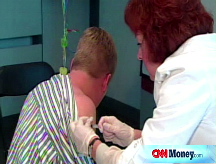The 'healthiest' area of the economy is...
...healthcare, according to market experts. The combination of solid earnings growth, merger activity and big dividends could make the sector a safe bet for '09.
NEW YORK (CNNMoney.com) -- The stock market and overall economy, to put it mildly, are very sick. However, one sector is holding up a lot better than the others: healthcare.
And there are signs that drug companies, biotechs and medical equipment firms may continue to be, if not recession-proof, recession-resistant.
Consider this. Only 20 stocks in the Standard & Poor's 500 gained ground Wednesday, a day when the overall market was bludgeoned due to fears about retail sales, bank losses and a steadily weakening economy.
Of those 20 winners, a lucky seven were healthcare stocks. And they were in a wide range of healthcare subsectors.
Big pharma firm Bristol-Myers Squibb (BMY, Fortune 500) rose about 1%, as did biotech Genzyme (GENZ). Botox maker Allergan (AGN) rose more than 3.5%. And shares of pharmacy benefits manager Medco Health Solutions (MHS, Fortune 500) gained nearly 4.5%
Healthcare stocks are typically viewed as safe havens in a rocky economy since, to be a little overly simplistic, people still get sick, go to doctors and buy medication.
And the fundamentals for healthcare companies appear to be holding up reasonably well during this economic downturn. As of the beginning of this week, only two of ten sectors were expected to post profit increases during the fourth quarter. Healthcare was one of them.
Along those lines, biotech giant Genentech (DNA) is expected to report strong fourth-quarter results Thursday afternoon. Analysts are forecasting a 23% increase in revenue and 39% jump in earnings per share from a year ago.
And late Tuesday, medical equipment maker Biomet, which went private in 2007 but still issues quarterly results, announced that sales in its most recent quarter increased 6%, due largely to strong demand for the company's hip and knee replacements.
The good news from Biomet appears to be one of the reasons why two other medical equipment companies in the S&P 500, Baxter International (BAX, Fortune 500) and Stryker (SYK, Fortune 500), rose Wednesday.
Another reason to like healthcare stocks is that the industry is one of the few right now in which there is any evidence of merger activity, as larger drug firms look to acquire biotechs and equipment firms.
On Monday, Abbott Laboratories (ABT, Fortune 500) announced it was buying laser vision correction device company Advanced Medical Optics (EYE) for $2.8 billion, nearly a 150% premium to the company's value last Friday.
Last week, Endo Pharmaceuticals (ENDP), the maker of painkiller Percocet, said it was purchasing biotech Indevus Pharmaceuticals (IDEV) for a 45% premium.
And there are two other potential big pharma-biotech deals in the works: Dutch biotech Crucell (CRUX) disclosed last week that it is in merger talks with Wyeth (WYE, Fortune 500), while Genentech has a received a takeover bid from Swiss drug company Roche.
So can healthcare stocks remain a bright spot in an otherwise bleak market? Some experts believe so.
Investment bank Lazard Capital Markets issued a report Thursday with its top stock picks for 2009. Of the 13 stocks chosen, five were healthcare stocks.
Subodh Kumar, an independent market strategist based in Toronto, said he also likes healthcare stocks, primarily because he expects more mergers and restructuring ahead. He argues that should be good news for both drug giants looking for ways to add new blockbusters to their pipelines and the biotechs that could get scooped up for a premium.
"The real sales and earnings growth opportunity for pharmaceuticals companies lies with acquiring new drugs through biotech firms instead of using their own research and development. And many have the cash to make deals," he said.
What's more, Kumar added that high dividend payments also make them attractive. Wyeth, for example, has a dividend that yields 3.2%, while Bristol-Myers Squibb pays a dividend that yields 5.6%
And unlike banks, Kumar said many drug firms have strong balance sheets. So they should be able to preserve their dividends, and could even raise them.
Still, no industry is immune (pardon the pun) from this painful recession, said Todd Campbell, president of E.B. Capital Markets, a Durham, N.H.-based research firm catering to institutional money mangers.
He said that with more people expected to lose their jobs, and with that, health insurance, this could be a problem for many drug companies.
But Campbell added that the recession is actually creating opportunities for companies that provide home healthcare services to the elderly via Medicare programs. That's because home healthcare tends to be cheaper than hospitals.
He thinks that three companies in this industry that could do well this year are Gentiva Health Services (GTIV), Amedisys (AMED) and LHC Group (LHCG).
In addition, Campbell said that these and other healthcare companies may actually be looking to hire people in 2009 to meet increased demand thanks to an aging U.S. population. With that in mind, he said some education and training companies that offer medical-related degrees, such as DeVry (DV), could be a "backdoor play" on healthcare.
"One of the few industries with substantial hiring is medical," Campbell said. "With all this unemployment, many will retrain for medical professions, such as nursing. That enrollment will be good for earnings growth at education service providers." ![]()



